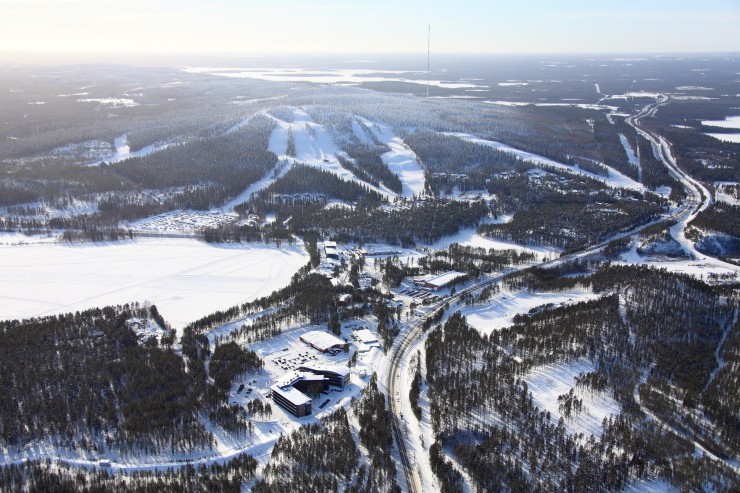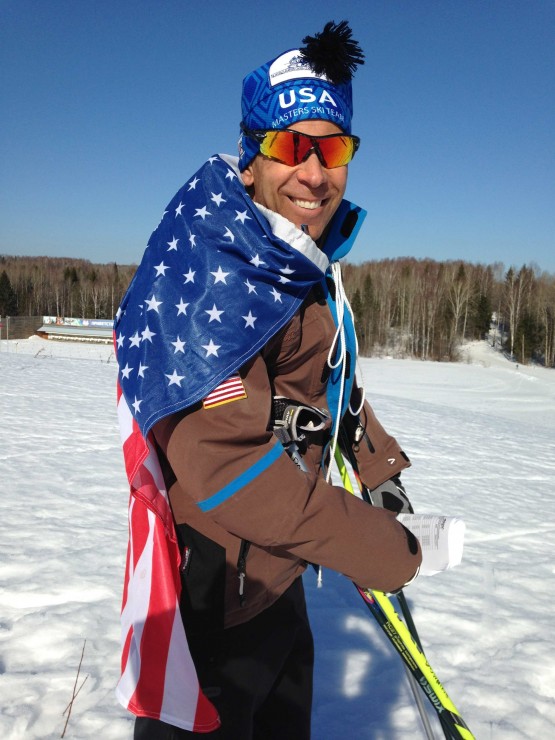
Every year, the Masters World Cup draws master skiers aged 30 and older from all around the world to World Cup-level venues for a week of FIS-World Championship-style racing. Finland will host the Masters World Cup for the fourth time in February 2016, welcoming roughly 1200 master skiers to Vuokatti.
Finland previously hosted the Masters World Cup in Kuusamo, and Kuopio, and most recently Rovaniemi, which took place in 2007. The 2016 site, Vuokatti, last hosted a World Cup in 1995, but has seen plenty of Scandinavian Cup and FIS racing since then. The venue hosts the Vuokatti Hiihto, one of Finland’s biggest ski marathons.
The Masters World Cup is open to skiers 30 and older and routinely attracts more than 1000 racers from more than a dozen countries. Each racer can compete in up to three individual events, with skiers choosing between skate or classic. Additionally, there is a relay competition in the middle of the championship week.
For the United States, the team is organized by American Cross Country Skiers (AXCS). No qualification is necessary; a skier only has to have an AXCS membership to represent the country.
John Downing is the head of AXCS and also the head coach of XC Oregon. He is particularly excited about the Finnish venue for 2016.

“The ski trails are, in the opinion of your humble USA National Director, some of the most enjoyable we’ve ever had for a Masters World Cup event,” Downing told FasterSkier this spring. “The first 5 k features a joyful romp of rolling terrain followed by a crossing of a small frozen lake, and then a simply spectacular loop up/down the side of a forested ridge. The diversity of terrain and visuals on the core 15 k trails rivals any MWC venue in the world.”
Besides the race courses, Downing pointed out that Vuokatti – which as well-known for its summer ski tunnel as for its winter trails – has over 150 k of skiing. That means plenty of great ski touring is available, too.
“The absolute best thing about Vuokatti is the MWC race loops are just the beginning when it comes to ski options,” Downing said. “An honest-to-gosh 150km of total trails are going to be at our disposal. Whether you want to race or not, there aren’t many places in the world that offer more great skiing options right out the door.”
For a full recap of the Masters World Cup experience, from racing to teamwork to opening and closing ceremonies, read the story here.
There are seven possible race starts per gender, with all distances featuring a classic and a freestyle option, plus a relay. Athletes can choose up to three individual competitions to enter; they are divided into age and gender classes, with the youngest racers age 30-35 racing in the M/F01 category, ages 36-40 in the M/F02, ages 41-45 in the M/F03, ages 46-50 in the M/F04 and so on.
The championships open with a medium length event: 10 k, 15 k or 30 k, depending on age and gender. The younger men race 30 k, men in the Master 7 through 9 categories and the younger women race 15 k, while the oldest men and all women in the Master 9 and older race 10 k. These events are held on the first two days of the championships, alternating between skate and classic for the first day, following with the other technique on the second day. The championships always start with opening ceremonies on a Friday, and the first races on Saturday.
The second event, held on the third day of the championships, is a short distance – 10 k for all younger men and women, and 5 k for men in the M10 and older as well women in the F9 and older. Both classic and skate races are held on the same day, with classic events in the morning and skate in the afternoon.
The final individual events are the long-distance races, held on the two last days of the championships (Thursday and Friday) and alternating between concluding with skate or classic. If the championships opened with skate technique on day one, the last long-distance event will be classic and vice versa. The long distance races range from 45 k for the youngest men, 30 k for the youngest women and the men in the M7 and older, and 15 k for the women in the F9 and older, and the men M10 and older.
Additionally, there are relay races for all ages on day five, Wednesday, after a rest day following the short distance races. Relays consist of two classic legs, followed by two skate legs. Nations can field as many teams as they like in both the men’s and the women’s categories. However, there are rules regarding the make-up of the team in terms of age. Older racers can be dropped down to field a team in a younger category, but there must be at least two racers of the correct age on the team. In other words, a maximum of two racers per team can drop down to a younger age category. The relay team selection is the discretion of the national directors.
All of this will go down the next time around in Vuokatti, one of the most popular all-year-round holiday resorts in Finland, and the organizers point out that Nordic skiing and racing is not the only game in town. Vuokatti is home to the Angry Birds app, and even has an entire theme park dedicated to the lively birds, unfortunately only open in the summer.
“You’ll have many ways to enjoy the beautiful Finnish nature and experiences, such as ice fishing, snowshoe hiking, skating on natural lake ice, or riding on Icelandic horses,” Marika Makkonen of the Vuokatti MWC Organizing Committee wrote in an email. “There are many kinds of safaris available like snowmobile safaris and husky safaris. Depending on the weather you may also experience the northern lights.”
–Chelsea Little contributed reporting.
Inge Scheve
Inge is FasterSkier's international reporter, born and bred in Norway. A cross-country ski racer and mountain runner, she also dabbles on two wheels in the offseason. If it's steep and long, she loves it. Follow her on Twitter: @IngeScheve.



